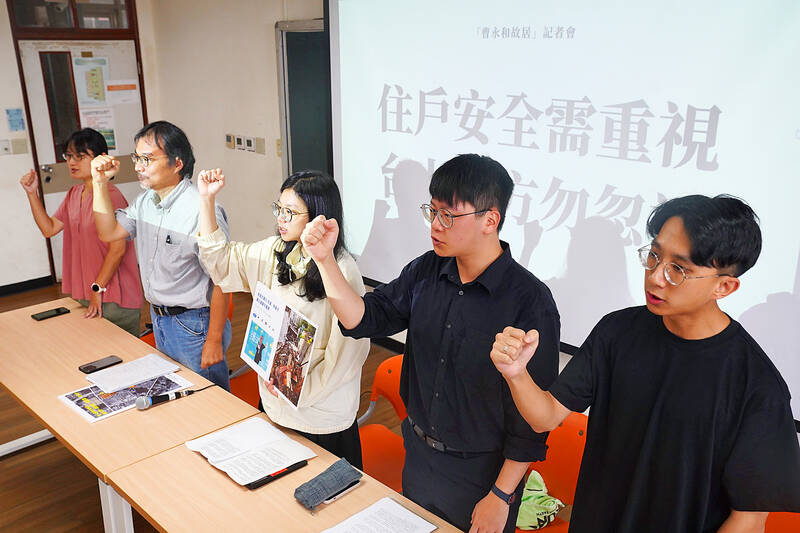Cultural workers and students yesterday condemned National Taiwan University (NTU) for demolishing the former residence of late historian Tsao Yung-ho (曹永和) on Wednesday without prior notice to residents.
The university rushed the razing of the first batch of dormitories built in 1928, cultural assets preservation worker Chen Chin-chung (陳勤忠) told a news conference in Taipei, adding that the demolition occurred ahead of National Cultural Heritage Day at the weekend and after Minister of Culture Li Yuan (李遠) recently said that “preserving ancient monuments is more important than building mansions.”
NTU Graduate Student Association academic affairs director Chuang Yung-chu (莊詠竹) said the demolition involved the Nos. 2, 4 and 6 properties on Lane 52 of Wenzhou Street.

Photo: CNA
House No. 6 was Tsao’s former residence, Chuang said.
A widow of a deceased former professor of the university, surnamed Ho (何), resides in house No. 8, a townhouse adjoining Tsao’s former residence and the only surviving residence among the dormitories, she said.
The teardown of Tsao’s former residence might have caused structural damages to her house, she added.
Chuang quoted local residents as saying that they had not received any notice about the demolition until personnel from the university’s General Affairs Office and demolition workers arrived at Ho’s house at about 7am on Wednesday.
The workers told the residents they would raze the neighboring buildings shortly before cutting power to Ho’s house the same day, she quoted the residents as saying.
The university said that residents had been informed of the demolition.
The four houses were culturally significant because their construction marked the beginning of Wenzhou Street, which features numerous old houses and trees, Chen said.
He questioned the city government’s review process of the demolotion project.
None of the 20 members of the Taipei Cultural Assets Review Committee entered Ho’s residence to evaluate the houses’ cultural assets, and in their review meetings, no one addressed that Tsao had lived at house No. 6 for 42 years, he said.
Although the academic and his residence is spiritually interconnected, the committee decided in May that Tsao’s former home “had no value as a cultural asset,” as it had been renovated many times, former NTU Graduate Student Association vice president Kao Cheng-yung (高鉦詠) said.
An administrative appeal of the demolition of Tsao’s former residence has been filed, Chuang said, adding that NTU must propose solutions to preserve cultural assets.
NTU said in a statement yesterday that the demolition notice had been pasted on the doors of the houses before Wednesday.
During an on-site inspection, university personnel had also informed the resident living in house No. 8 about the razing of the three houses and the plan to reinforce the walls between houses Nos. 6 and 8 in mid-July ahead of the demolition, it said.
The resident thanked the university for carefully carrying out the demolition work without affecting her residential rights, the university said, adding that the resident had been fully informed of the project.
Communications about the demolition were made in compliance with Article 15 of the Cultural Heritage Preservation Act (文化資產保存法) with residents and cultural assets preservation groups, who had voiced their opinions on the issue multiple times until the committee decided the houses “had no value as cultural assets,” it said.

Japanese footwear brand Onitsuka Tiger today issued a public apology and said it has suspended an employee amid allegations that the staff member discriminated against a Vietnamese customer at its Taipei 101 store. Posting on the social media platform Threads yesterday, a user said that an employee at the store said that “those shoes are very expensive” when her friend, who is a migrant worker from Vietnam, asked for assistance. The employee then ignored her until she asked again, to which she replied: "We don't have a size 37." The post had amassed nearly 26,000 likes and 916 comments as of this

US President Donald Trump said "it’s up to" Chinese President Xi Jinping (習近平) what China does on Taiwan, but that he would be "very unhappy" with a change in the "status quo," the New York Times said in an interview published yesterday. Xi "considers it to be a part of China, and that’s up to him what he’s going to be doing," Trump told the newspaper on Wednesday. "But I’ve expressed to him that I would be very unhappy if he did that, and I don’t think he’ll do that," he added. "I hope he doesn’t do that." Trump made the comments in

Tourism in Kenting fell to a historic low for the second consecutive year last year, impacting hotels and other local businesses that rely on a steady stream of domestic tourists, the latest data showed. A total of 2.139 million tourists visited Kenting last year, down slightly from 2.14 million in 2024, the data showed. The number of tourists who visited the national park on the Hengchun Peninsula peaked in 2015 at 8.37 million people. That number has been below 2.2 million for two years, although there was a spike in October last year due to multiple long weekends. The occupancy rate for hotels

A cold surge advisory was today issued for 18 cities and counties across Taiwan, with temperatures of below 10°C forecast during the day and into tonight, the Central Weather Administration (CWA) said. New Taipei City, Taipei, Taoyuan and Hsinchu, Miaoli and Yilan counties are expected to experience sustained temperatures of 10°C or lower, the CWA said. Temperatures are likely to temporarily drop below 10°C in most other areas, except Taitung, Pingtung, Penghu and Lienchiang (Matsu) counties, CWA data showed. The cold weather is being caused by a strong continental cold air mass, combined with radiative cooling, a process in which heat escapes from